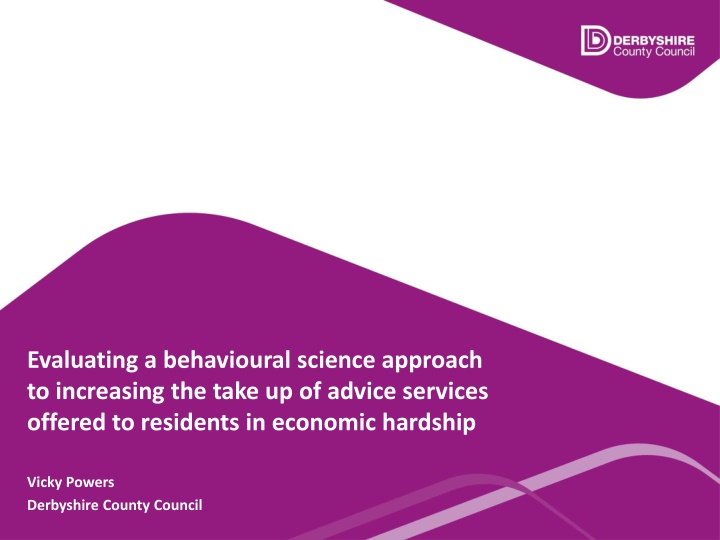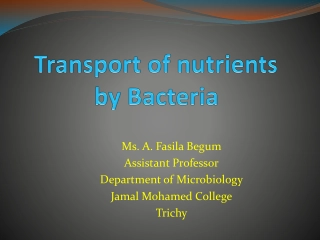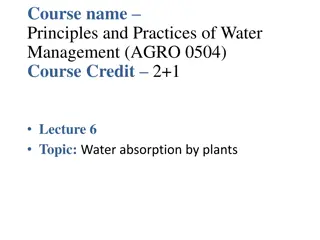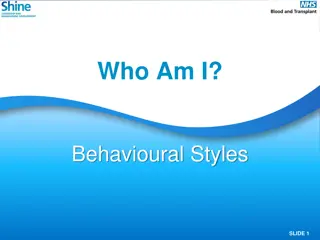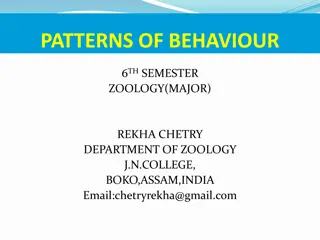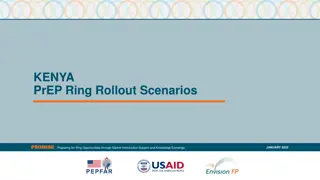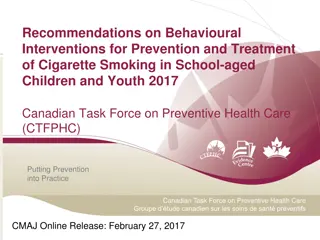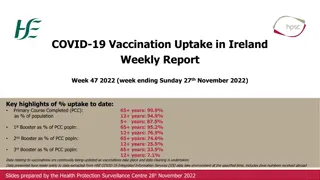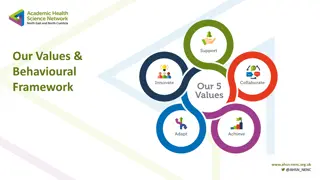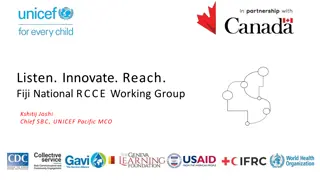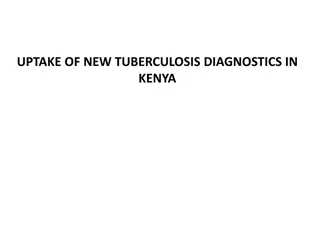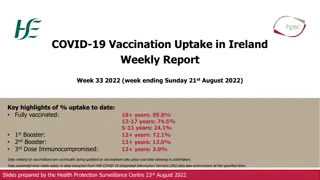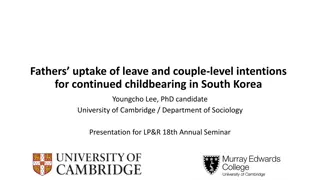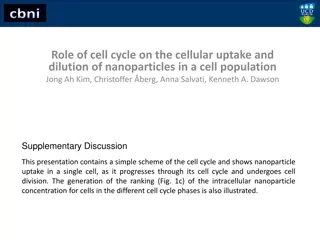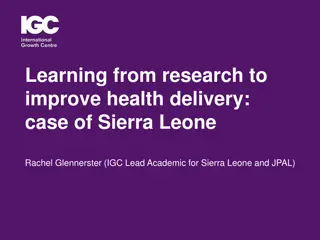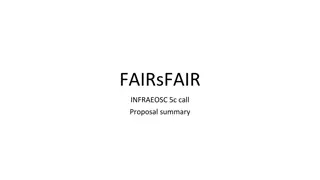Evaluating a Behavioural Science Approach for Increasing Advice Service Uptake
Derbyshire County Council is evaluating a behavioural science approach to enhance the uptake of advice services for residents in economic hardship. The project focuses on increasing caller referrals to support agencies, using Randomised Controlled Trials (RCTs) to evaluate interventions' impact and prove the effectiveness of this approach. By improving signposting, referrals, and engagement strategies, the project aims to assist vulnerable residents in accessing crucial support services effectively.
Download Presentation

Please find below an Image/Link to download the presentation.
The content on the website is provided AS IS for your information and personal use only. It may not be sold, licensed, or shared on other websites without obtaining consent from the author.If you encounter any issues during the download, it is possible that the publisher has removed the file from their server.
You are allowed to download the files provided on this website for personal or commercial use, subject to the condition that they are used lawfully. All files are the property of their respective owners.
The content on the website is provided AS IS for your information and personal use only. It may not be sold, licensed, or shared on other websites without obtaining consent from the author.
E N D
Presentation Transcript
Evaluating a behavioural science approach to increasing the take up of advice services offered to residents in economic hardship Vicky Powers Derbyshire County Council
Opportunity and challenge Opportunity Derbyshire s Local Welfare Assistance Fund (Derbyshire Discretionary Fund) is a key touchpoint - speaks with Derbyshire s most vulnerable residents, at a critical point. 27k calls, callers from 20% most deprived areas, ~40% of calls could be prevented with better financial management. Improve signposting and referrals to support Preventative opportunity - shift from head in the sand to engagement Build relationships with partners (big picture) - joined up approach between agencies. Challenge DDF was signposting to Citizens Advice / other agencies - but not tracking data or outcomes off into the ether Time pressured call, the callers were focused on the immediate decision (present biased), information wasn t landing (cognitive load, linked with debt). Welfare Rights internal referral data showed that contact was not always made, (38% dropped), despite repeat calls.
Local Government Association (LGA) Behavioural Insights Project Apply behavioural insights to a range of local government challenges. & Introduce and embed a behavioural science approach. DDF Project 1. To apply behavioural insights to increase caller referrals to support agencies. Increasing support accessed by vulnerable residents. 2. To use an evidence based approach to evaluate the impact of any interventions - Randomised Controlled Trials (RCT). 3. To help prove the value and effectiveness of a behavioural science approach.
Project Overview Scoping Phase - To establish feasibility and initial concepts COVID-19 - Paused and reviewed feasibility Delivery Phase Identify & build partnership relationships Project Management - GDPR / Ethics sign off Design and launch 3 trials Citizens Advice - Completed Welfare Rights - Completed Money Sorted - Low referral numbers Analysis & Write up Final Report - Draft 1 being reviewed
Referral process - behaviour change REFERRAL TRIALS Increased focus and awareness on referrals. Through meetings, raffles Providing Feedback to DMs Case Studies on impact Reinforces behaviour Mosaic System. Call management system Provide prompts in the call process Increasing DM agency Only referring engaged callers, DM judgement is important. Screening and Decision Support Materials. Cheat sheets
Randomised Control Trials Why RCT? Gold standard in terms of evaluation One of the aims of the funding stream Screening Trials - Impractical: randomising and control of the interventions. (Pre - Post) Referral handover trials Citizen s Advice Welfare Rights Randomising - Using the last digit of the National Insurance Number Monitoring / Tracking results Through Mosaic Data from partner organisation (contact and issues) (anonymised and aggregated)
Citizens Advice Trial Project Set Up Defined the profile of caller CA wanted. No complex issues Broad range of issues Qualified / Engaged applicants Trial A commitment device to reduce the drop out of referrals to reduce staff time spent chasing referrals The referral was conditional on applicants responding to the SMS SMS - sent +24 hours after the call Sample of 610 was required to conduct an RCT.
Citizens Advice trial results The CAB trial was run from the 11th May 2021 to the 9th November 2021. Stopped early as the data showed SMS intervention was acting as a barrier to referral take up. The SMS intervention reduces the likelihood of callers making contact with CAB at a 99.9% confidence level. The value of z is 4.6614. The value of p is < .00001. The result is significant at p < .01. Two tailed z- test Responding positively to the SMS text increases the likelihood of callers taking up the referral was marginally significant with 90% confidence. The value of z is 1.3617. The value of p is .08692. The result is significant at p < .10. One tailed z- test.
Welfare Rights Trial Working in concert with Citizens Advice Trial Same set up as CA. The SMS was used as a reminder, recipients do not need to confirm to be referred. SMS Sent after the referral. Response was recorded. Wider access to data as an internal service
Welfare Rights trial results The WR trial was run from the 22nd April 2021 to the 22nd Feb 2022. The trial was stopped early again because of the negative impact of the SMS on referral take up. The SMS intervention reduces the likelihood of callers making contact with WR at a 95% confidence level. The value of z is -2.223. The value of p is .02642. The result is significant at p < .05. Responding positively to the SMS text increases the likelihood of callers taking up the referral. This was marginally significant with 90% confidence. The value of z is 1.6341. The value of p is .05155. The result is significant at p < .10. One tailed z-test.
SMS trial conclusions The SMS acts as a barrier to the take up of the referrals. Correct to stop the trials - Given DDF goals and the goals of the project - increasing support to vulnerable residents. We believe the reasons for these results could include: 1. Any extra step requiring effort results in drop-out. Complexity adds confusion. 2. Increase in SMS fraud during the period of the trial - reduces trust (increase 700%) 3. We changed the screening process / DM - Callers are only being referred when engaged. The need for a commitment device has been reduced. SMS has proved challenging for DCC in other contexts, for school holiday food vouchers, 15% of payments made by SMS were initially unclaimed, despite this being a direct payment to recipients. BUT for those who did respond to the CAB SMS it did act as a commitment device - increasing referral take up. Marginally significant, if the trial had gone on probably a significant finding
Reflections Challenges: Covid impact on services resulted in a longer set up time RCT challenging to put something in place that was practical couldn t focus on screening process Hard to identify and measure outcomes for a control group Ethics and informed consent difficult with a cohort at the point of financial crisis Adherence to process by case assessors was an issue lower than expected sample size Long term outcomes difficult to capture
Reflections Benefits: RCT over pre/post as there were constant changes throughout the trial period new staff, new funding streams, massive increase in demand Infrastructure now in place for future test and learn Learnt what didn t work and responded in a timely fashion
